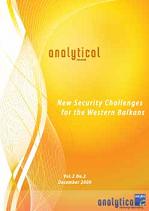THE ORGANISED CRIME AS A CONTEMPORARY NON-TRADITIONAL SECURITY THREAT AND CHALLENGE FOR THE WESTERN BALKANS
THE ORGANISED CRIME AS A CONTEMPORARY NON-TRADITIONAL SECURITY THREAT AND CHALLENGE FOR THE WESTERN BALKANS
Author(s): Tanja MiloshevskaSubject(s): Politics / Political Sciences
Published by: Аналитика Тинк-тенк Организација
Summary/Abstract: This paper examines the dynamics and trends of organised crime as a security threat and challenge for the Western Balkans. This paper highlights the principal issues and concerns about nontraditional global security threats upon national security and regional stability. It reflects the widespread concern about the impact of three main sectors of organised crime activities-narcotic trade; illegal trafficking of small arms and light weapons and human trafficking are having on political and regional stability and economic vitality of the states in the Western Balkans. Today’s security challenges tend to be more disperse, less predictable, and more ultidimensional than those of the Cold War era. In the past years, the security-policy milieu has changed from one dominated by the traditional threat of interstate war to one dominated by diffuse and (in most cases) non-military risks. Most of these challenges are not actually new at all, but since the end of the Cold War have just received more attention. The primary challenge of analyzing contemporary non-traditional security threats is determining which ones are most critical to national and regional security. As has become apparent by now, traditional security risks related to armed conflict in the Western Balkans have given rise to new, softer versions based on the spread of organised crime and governance failures caused by systemic corruption. The problem of organised crime is further complicated by the fact that the most major criminals are often political and societal elites – powerful politicians, businesspeople, and unofficial power brokers. There is no economic motivation for organised crime to weaken, and thus it will continue to threaten the world order into 21st century. However, as the nature of crime changes and as new threats emerge, policies against crime will need to adjust. Thus, being successful against the new challenges to the security and reforms in the Western Balkans is preconditioned on the leaving from the conventional state-oriented thinking. Organised crime in the Western Balkans represents serious threat to peace, reconciliation, security, stability and sustainable development on individual, national, regional and international level. Combating organised crime requires a pro-active thinking, which involves also the cooperation between the public and private sector. It is also necessary to develop a multidisciplinary approach to the phenomenon, a close cooperation between political decision factors, the executive institutions and legislative ones.
Journal: Analytical
- Issue Year: 2009
- Issue No: 04
- Page Range: 1-12
- Page Count: 12
- Language: English

